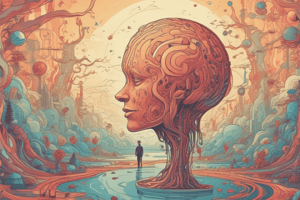Podcast
Questions and Answers
Match the following behavioral concepts with their descriptions:
Match the following behavioral concepts with their descriptions:
Decision based = Conscious deciding process to/not perform an act or practice One-time behavior = Few occurrences in a lifetime Routine/habit = Regularly occurring action Addictive behavior = One reinforced by bio or psych adaptation resulting in substance dependency
Match the following cultural behaviors with their definitions:
Match the following cultural behaviors with their definitions:
Tradition = Behavior passed down over time by sections of society e.g. family tradition Custom = Behavior shared by group/population that forms part of culture of community (larger scale vs tradition) Lifestyle = Behaviors that constitute one’s way of life Decision based = Conscious deciding process to/not perform an act or practice
Match the following lay referral system behaviors with their descriptions:
Match the following lay referral system behaviors with their descriptions:
Illness behavior = Behaviors at symptom onset/upon awareness of symptoms Self-medication = At home administration of remedies (herbal, OTC drugs, techniques) as first action taken towards wellness Advice seeking = Patient's state of illness is legitimized/acknowledged by other party Post-consult = Patient may acquire prescription and advice; further action can be recommended
Match the following cultural behaviors with their scale and descriptions:
Match the following cultural behaviors with their scale and descriptions:
Match the following illness behaviors with their descriptions:
Match the following illness behaviors with their descriptions:
Match the following illness behavior theories with their proponents and year of development:
Match the following illness behavior theories with their proponents and year of development:
Match the following societal behavioral models with their descriptions:
Match the following societal behavioral models with their descriptions:
Match the following decision-making processes with their definitions:
Match the following decision-making processes with their definitions:
Match the following cultural behaviors with their scale and descriptions:
Match the following cultural behaviors with their scale and descriptions:
Match the following societal levels with their associated behavioral models:
Match the following societal levels with their associated behavioral models:
Match the following behavioral patterns with their characteristics:
Match the following behavioral patterns with their characteristics:
Match the following behavioral theories with their proponents and year of development:
Match the following behavioral theories with their proponents and year of development:
Match the following lay referral system behaviors with their descriptions:
Match the following lay referral system behaviors with their descriptions:
Match the following societal levels with their associated theories of behavior change:
Match the following societal levels with their associated theories of behavior change:
Flashcards are hidden until you start studying
Study Notes
Behavioral Concepts and Descriptions
- Behavioral concepts can be categorized based on their foundational definitions and applications in various contexts.
- Understanding these concepts is essential for recognizing how behaviors manifest in different settings, influencing approaches to health, society, and decision-making.
Cultural Behaviors and Definitions
- Cultural behaviors refer to the shared practices and beliefs within a community or society.
- They are influenced by historical, social, and environmental factors, shaping individual actions and social norms.
Lay Referral System Behaviors
- Lay referral systems consist of informal networks providing advice and support in health-related situations.
- These behaviors are integral in shaping how individuals perceive symptoms and seek professional care, often prior to formal medical consultation.
Cultural Behaviors Scale and Descriptions
- Cultural behaviors can be assessed on scales ranging from individual to collective actions, reflecting the impact of cultural background on behavior.
- The scale can influence the response to health interventions and the perception of illness within a community.
Illness Behaviors and Descriptions
- Illness behaviors involve the ways individuals respond to perceived health issues, including symptom recognition and coping mechanisms.
- These variations in responses are influenced by personal, cultural, and social factors.
Illness Behavior Theories and Proponents
- Various theories explain illness behaviors, often linked to specific proponents and their timelines.
- Understanding these theories enhances the comprehension of patient responses and guides healthcare approaches.
Societal Behavioral Models and Descriptions
- Societal behavioral models encompass frameworks that explain how societal norms influence individual actions.
- These models help in analyzing public health strategies and interventions aimed at behavior change.
Decision-Making Processes and Definitions
- Decision-making processes are the cognitive steps individuals take when choosing a course of action regarding health or lifestyle.
- Recognizing these processes aids in designing effective communication and interventions for better health decision outcomes.
Societal Levels and Associated Behavioral Models
- Behavioral models can be aligned with various societal levels, such as individual, group, and community.
- This alignment assists in understanding the broader implications of behavior on public health and policy development.
Behavioral Patterns and Characteristics
- Behavioral patterns are consistent and repeatable actions individuals exhibit in specific situations.
- The characteristics of these patterns reveal important insights into motivations and barriers to behavior change.
Behavioral Theories and Proponents
- Key behavioral theories are often tied to their originator’s research and the period of development, offering a historical perspective on behavior understanding.
- This knowledge contributes to the evaluation of health interventions and the effectiveness of behavioral change strategies.
Societal Levels and Theories of Behavior Change
- Different societal levels apply specific theories of behavior change, highlighting the urgency of context in health behavior.
- These theories guide interventions that consider societal structures and influences on individual health behaviors.
Studying That Suits You
Use AI to generate personalized quizzes and flashcards to suit your learning preferences.




